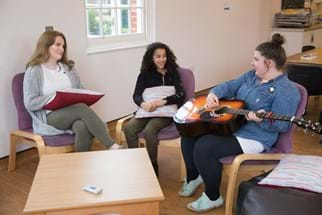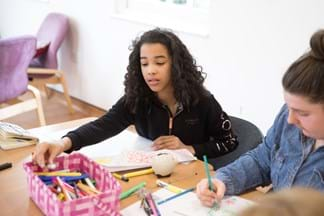I am a professional working with Children and Young People
If you work with children and young people, you may find some of the information below helpful.
In 2005, 1 in every 10 children and young people (aged 5-16 years) had a diagnosable mental problem, so in a classroom of 30 children, it is expected that around 3 children would have a diagnosable mental health problem. It is likely that there will be a higher number of children who have mental health difficulties, but they are not to a diagnosable level.


If you work with children and young people, it may be that you are one of the first points of contact for them if they want to discuss something about their emotional and mental wellbeing. You may also notice something unusual that causes you some concern.
How can I increase my knowledge of Mental Health in Children and Young people?
Young Minds offer some training courses that you may find helpful to increase your understanding of child and adolescent mental health. These can be found here.
MindEd also offer free educational resources for adults working with children and young people. These resources are best accessed by registering a free learning account here.
How can I engage with the children and Young people I work with?
Sometimes it can be difficult to have a conversation with children and young people about their mental health, especially if you have serious concerns and are worried they may want to take their life. The spot the signs campaign offers a free training to professionals working with children and young people, on how to spot the signs that children and young people are struggling to cope and may be considering suicide. They also provide tips on how to have difficult conversations around suicide and how to support the young person if this is how they are feeling.
What if I am unable to help?
If it is something that you cannot help with, you may find it useful to visit our Get help now page. This page features what to do in an emergency as well as providing other useful contacts for children and adolescents mental health and emotional wellbeing.
Finally if they have help at school or in the community and they feel this is not helping it might be time to consider referring them to CAMHS.

Anyone can make a referral by calling our Single Point of Access (SPA) team on 0300 777 0707 or emailing them at hpft.spa@nhs.net
Once you have contact our SPA team and made a referral the SPA team would then advise on the appropriate support and this may be a referral to support from our HPFT CAMHS or it may be signposting to other organisations that may be a better fit for the support needed.
If a referral is made to our HPFT CAMHS this may be accepted and the individual will receive what we call a choice appointment, which is an opportunity for things to be discussed between the young person, their parent or carer and a clinician. The referral may not be accepted, at which point the young person again may be signposted to more appropriate support for them.
If the referral is accepted by HPFT CAMHS services, the young person may find it helpful to visit our what to expect page.
CAMHS offer a range of different therapies, the one that is selected will depend on the individuals needs. The individuals needs would be assessed at the frst This support may include cognitive behavioural therapy, different forms of psychotherapy, solution focused therapy or family therapy.
Children and young people can refer themselves to HPFT CAMHS by calling our Single Point of Access (SPA) on 0300 777 0707. They can speak to one of our friendly SPA team members about what is troubling them and refer themselves to our CAMHS services.
If a young person is reluctant to seek help, sometimes it is because they are worried about what will happen, you may find it helpful to go through this with them.
Firstly the young person could speak to a member of our SPA team and tell them how they feel and what is difficult for them to cope with. Our SPA team would then advise on the appropriate support and this may be a referral to support from our HPFT CAMHS or it may be signposting to other organisations that may be a better fit for the support needed.
If a referral is made to our HPFT CAMHS this may be accepted and the individual will receive what we call a choice appointment, which is an opportunity for things to be discussed between the young person, their parent or carer and a clinician. The referral may not be accepted, at which point the young person again may be signposted to more appropriate support for them.
If the referral is accepted by HPFT CAMHS services, the young person may find it helpful to visit our what to expect page.
CAMHS (Child and Adolescent Mental Health Services) are a service that provides support and therapies to children and young people, up to the age of 18. They are a service made up of a variety of professionals and our CAMHS services in Hertfordshire use a Tier system.
Tier 1 services are universal mental health services for those in the early stages of some mental health difficulties. They contribute to the promotion of mental health and provide support and advice. They may also complete referrals to higher tiers if they feel the individual needs more specialist support.
Tier 2 services involve mental health professionals who will provide support, counselling or therapy to those with mild to moderate mental health problems. They work in community or primary care settings and may include professionals such as school pastoral teams, counsellors or paediatricians.
Tier 3 services are our more specialist CAMHS services and these are made up of many different professionals who will provide specialist therapy and sometimes medication to the child and/or their family. This tier is for those with more severe mental health problems or where support provided at other interventions has not stopped or reduced the difficulties.
Tier 4 services are for those young people where there are concerns about their safety and they may require an inpatient admission.
HPFT provides CAMHS services within Tier 3 and Tier 4. There are other organisations that provide support at Tier 1 and Tier 2. For more information about the Tier systems please click here.
HPFT CAMHS help children and young people up to the age of 18 who are struggling to cope with their emotional and mental wellbeing.
There are lots of different reasons why children, young people and their families might come to CAMHS. Children and young people go through lots of changes, both physically, emotionally and socially, and for a lot of us this can experienced as very stressful. Some people may find it more difficult to cope with the stress and may need some support, which may be provided through CAMHS. Some more specific reasons why children and their families come to CAMHS are if they are feel sad or worried or angry a lot of the time. While these are all normal feelings that we all experience, when someone experiences too much of one of these it can start to affect their relationships, their home and school life, and leisure activities.
HPFT (Hertfordshire Partnership University NHS Foundation Trust) provide mental health and learning disability services across Hertfordshire, Buckinghamshire, Norfolk and North Essex. We only provide Child and Adolescent Mental Health Services (CAMHS) in Hertfordshire. For more information on HPFT please visit our main site at www.hpft.nhs.uk.
Please let us know what you think of the website here.

